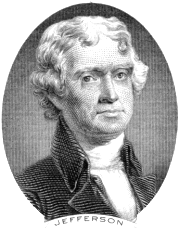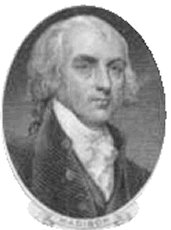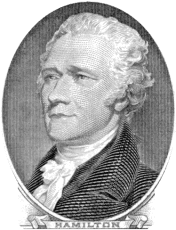 Another response to A Well Regulated Militia...熔n what the Founding Fathers thought:
Another response to A Well Regulated Militia...熔n what the Founding Fathers thought: Another response to A Well Regulated Militia...熔n what the Founding Fathers thought:
Another response to A Well Regulated Militia...熔n what the Founding Fathers thought:
>> "False is the idea of utility that sacrifices a thousand real advantages for one imaginary or trifling inconvenience; what would take fire from men because it burns, and water because one may drown in it; that has no remedy for evils, except destruction. The laws that forbid the carrying of arms are laws of such a nature. They disarm those only who are neither inclined nor determined to commit crimes."
Thomas Jefferson <<
Yeah, yeah. These quotes are a dime a dozen. For instance:
No freeman shall ever be debarred the use of arms.
Thomas Jefferson, proposed Virginia Constitution, June 1776
The strongest reason for people to retain the right to keep and bear arms is, as a last resort, to protect themselves against tyranny in government.
Thomas Jefferson, Papers of Thomas Jefferson, 334 (C.J.Boyd, Ed., 1950)
Etc., etc., etc.
Jefferson rebutted
1) Laws that require background checks, waiting periods, registration, licensing, safety tests, or trigger locks don't forbid or disbar the keeping or bearing of arms. They regulate it. Regulating is different from forbidding.
2) Several quotes make it clear which rights Jefferson considered basic. The right to bear arms wasn't one of them.
By a declaration of rights, I mean one which shall stipulate freedom of religion, freedom of the press, freedom of commerce against monopolies, trial by juries in all cases, no suspensions of the habeas corpus, no standing armies. These are fetters against doing evil which no honest government should decline.
Thomas Jefferson to Alexander Donald, February 7, 1788, Papers, 12:571
The Constitutions of our several States vary more or less in some particulars. But there are certain principles in which all agree, and which all cherish as vitally essential to the protection of the life, liberty, property, and safety of the citizen: 1. Freedom of religion, restricted only from acts of trespass on that of others; 2. Freedom of person, securing every one from imprisonment or other bodily restraint but by the laws of the land. This is effected by the well-know law of habeas corpus; 3. Trial by jury, the best of all safeguards for the person, the property, and the fame of every individual; 4. The exclusive right of legislation and taxation in the representatives of the people; 5. Freedom of the press, subject only to liability for personal injuries.
Thomas Jefferson to A. Coray, October 31, 1823, Writings 15:489

3) Federalists such as Hamilton thought the Bill of Rights was unnecessary. So did Madison, who did much of the work on the Constitution and Bill of Rights. According to The Strange Battle for the Bill of Rights:
As late as October 17, 1788, when Madison wrote Jefferson, he was still resisting the idea of a bill of rights. "I have never thought the omission [of a bill of rights from the Constitution] a serious defect," Madison told his friend, "nor have been anxious to supply it even by subsequent amendment, for any reason other than that it is anxiously desired by others. I have favored it because I supposed it might be of use, and if properly executed could not be of disservice. I have not viewed it in an important light."
4) As one site put it, "Thomas Jefferson was in France during the ratification process and could only participate in the constitutional debate through correspondence." So he was more a bystander than a participant in the process.
5) Your quote comes from Jefferson's Commonplace Book, in which he quotes criminologist Cesare Beccaria. Sorry, I don't recognize Jefferson as the Founders' preeminent constitutional authority. I don't recognize Beccaria as any constitutional authority.
Breccia also wrote against capital punishment. As an LA Times book review (4/8/01) notes:
If you agree that these Founding Fathers meant to banish state executions, I'll agree that maybe they meant to grant an unlimited right to bear arms.
Founders didn't bar regulation...
Judging by a Google search, a lot of gun nuts have quoted Jefferson and other luminaries on whether Americans can bear arms or not. These quotes all address the absolute question of keeping or not keeping, bearing or not bearing. None address the conditional question of keeping or bearing subject to reasonable regulations.
The 2nd Amendment is clearly conditional and the condition is a "well regulated militia." When you find a single Founding Father saying the government can't limit or regulate arms in any way, shape, or form, please quote him for me. I've read the quotes and I'm guessing such a quote doesn't exist.
Similarly, no quote addresses the fact that the Founders were talking only about muskets and other simple arms. If you think the Founders would've approved of bearing arms such as assault rifles or semi-automatic pistols溶ot to mention nukes or biochemical bombs用rove it. Show me a single quote stating a person's right to own catapults, cannons, or gunpowder bombs, which did exist then.
Incidentally, if we're literally going by the text, the right to keep and bear arms isn't the right to buy arms. Technically, we could ban gun purchases without altering your right to whatever guns you might encounter預 loaner from your local militia, perhaps. Nor does the right to keep and bear arms grant you the right to use arms. I could go on, but I trust I've made my point.
...and Hamilton favored it
Meanwhile, here's what Alexander Hamilton, the Constitution's leading proponent, had to say about regulation. From Federalist No. 29, a paper he devoted to the subject of militias:
THE power of regulating the militia, and of commanding its services in times of insurrection and invasion are natural incidents to the duties of superintending the common defense, and of watching over the internal peace of the Confederacy.

It requires no skill in the science of war to discern that uniformity in the organization and discipline of the militia would be attended with the most beneficial effects, whenever they were called into service for the public defense. It would enable them to discharge the duties of the camp and of the field with mutual intelligence and concert an advantage of peculiar moment in the operations of an army; and it would fit them much sooner to acquire the degree of proficiency in military functions which would be essential to their usefulness. This desirable uniformity can only be accomplished by confiding the regulation of the militia to the direction of the national authority. It is, therefore, with the most evident propriety, that the plan of the convention proposes to empower the Union "to provide for organizing, arming, and disciplining the militia...."
And
Where in the name of common-sense, are our fears to end if we may not trust our sons, our brothers, our neighbors, our fellow-citizens? What shadow of danger can there be from men who are daily mingling with the rest of their countrymen and who participate with them in the same feelings, sentiments, habits and interests? What reasonable cause of apprehension can be inferred from a power in the Union to prescribe regulations for the militia...?
Not clear enough? How much clearer do you need the following to be?
If a well-regulated militia be the most natural defense of a free country, it ought certainly to be under the and at the disposal of that body which is constituted the guardian of the national security.
If there's a clearer exposition of the key phrase "a well regulated militia" in all the Founders' writings, I haven't seen it. For starters, Hamilton plainly defined a militia as a specific armed body, not the entire populace. But no matter how he defined it, it's certain he asserted the right to regulate it. Superintending the common defense, explicitly part of the government's constitutional power, included regulating the militia. The definition of "militia" is irrelevant since the definition of "regulating" is incontrovertible.
Regulation well-grounded in history
That the Founders had no problem with gun regulation isn't surprising given the long history of such regulation in English law. The Founders' Constitution, a comprehensive database of documents organized by the University of Chicago, provides some key pieces of this history. As items written before and after the Constitution show, the Founders were familiar with the concept of regulation.
Item, it is enacted, that no man great nor small, of what condition soever he be...be so hardy to come before the King's justices, or other of the King's ministers doing their office, with force and arms, nor bring no force in affray of the peace, nor to go nor ride armed by night nor by day, in fairs, markets, nor in the presence of the justices or other ministers, nor in no part elsewhere, upon pain to forfeit their armour to the King, and their bodies to prison at the King's pleasure.
Statute of Northampton, 2 Edw. 3, c. 3, 1328
7. That the subjects which are protestants, may have arms for their defence suitable to their conditions, and as allowed by law.
Bill of Rights, sec. 7
1 W. & M., 2d sess., c. 2 , December 16, 1689
5. The fifth and last auxiliary right of the subject, that I shall at present mention, is that of having arms for their defence, suitable to their condition and degree, and such as are allowed by law. Which is also declared by the same statute I W. & M. st. 2. c. 2. and is indeed a public allowance, under due restrictions, of the natural right of resistance and self-preservation, when the sanctions of society and laws are found insufficient to restrain the violence of oppression.
William Blackstone, Commentaries, 1:139, 1765
In the second article, it is declared, that a well regulated militia is necessary to the security of a free state; a proposition from which few will dissent. Although in actual war, the services of regular troops are confessedly more valuable; yet, while peace prevails, and in the commencement of a war before a regular force can be raised, the militia form the palladium of the country. They are ready to repel invasion, to suppress insurrection, and preserve the good order and peace of government. That they should be well regulated, is judiciously added. A disorderly militia is disgraceful to itself, and dangerous not to the enemy, but to its own country. The duty of the state government is, to adopt such regulations as will tend to make good soldiers with the least interruptions of the ordinary and useful occupations of civil life. In this all the Union has a strong and visible interest.
The corollary, from the first position, is, that the right of the people to keep and bear arms shall not be infringed.
.
.
.
This right ought not, however, in any government, to be abused to the disturbance of the public peace.
An assemblage of persons with arms, for an unlawful purpose, is an indictable offence, and even the carrying of arms abroad by a single individual, attended with circumstances giving just reason to fear that he purposes to make an unlawful use of them, would be sufficient cause to require him to give surety of the peace. If he refused he would be liable to imprisonment.
William Rawle, A View of the Constitution of the United States, 125-26, 1829 (2d ed.)
The right of the citizens to keep and bear arms has justly been considered, as the palladium of the liberties of a republic; since it offers a strong moral check against the usurpation and arbitrary power of rulers; and will generally, even if these are successful in the first instance, enable the people to resist and triumph over them. And yet, though this truth would seem so clear, and the importance of a well regulated militia would seem so undeniable, it cannot be disguised, that among the American people there is a growing indifference to any system of militia discipline, and a strong disposition, from a sense of its burthens, to be rid of all regulations. How it is practicable to keep the people duly armed without some organization, it is difficult to see. There is certainly no small danger, that indifference may lead to disgust, and disgust to contempt; and thus gradually undermine all the protection intended by this clause of our national bill of rights.
Joseph Story, Commentaries on the Constitution, 3:ァァ, 1890, 1833
It was held in this case, that the statute of 1831, prohibiting all persons, except travelers, from wearing or carrying concealed weapons, is not unconstitutional.
State v. Mitchell, 3 Ind. 229, 1833
I'm happy to admit that a couple documents support a broader right to bear arms than the ones I quoted. Refer back to my meta-point about interpreting the Constitution. If some Founders and documents support a narrow interpretation and some support a broad interpretation, the key word is "interpretation." Without one fixed standard, we can choose whichever interpretation we like.
If people's interpretations disagree, the courts decide. Today the courts' and the people's interpretations agree. A majority of both say the right to bear arms shall be well-regulated. So shall it be.
Quoting without thinking
I notice the gun nuts who quote Jefferson don't list many quotes from Hamilton or Madison. The best they come up with from Madison seems to be Federalist No. 46, which I've rebutted at length in A Well Regulated Militia.... So the two leading constitutional proponents either supported regulation or had nothing to say about it.
Perhaps the most amusing part of this is how unthinking the gun nuts are. Consider the following quote attributed to Hamilton:
The best we can hope for concerning the people at large is that they be properly armed.
If you search for it on the Net, you'll find it attributed to "Hamilton at 184," or "Hamilton at 184-8," as if that's a valid citation of the Federalist Papers. If those are supposed to be page numbers, uh, the page numbers vary depending on which edition you're using. And no matter which edition you're using, the quote doesn't span five pages. Duh.
My version of the Federalist Papers puts pgs. 184-188 in Federalist No. 29, which would make sense since No. 29 is about regulating militias. Unfortunately, Hamilton takes a pro-regulation position in No. 29, as we've seen. And nowhere in it does the above quotation appear.
Even sillier are the people who've attributed the quote to Hamilton in Federalist No. 46. Uh, Madison wrote No. 46, not Hamilton. And again, these words don't appear in it. Take my word for it or search the full text of the papers yourself.
If one person cited the correct source of Hamilton's alleged quote, I haven't found it yet. Basically, a thousand doofuses have copied the same quotations over and over without thinking about them, looking up their context, or even verifying the citations. That they quoted Hamilton when he favored regulation is the clearest proof of this.
Tsk, tsk, doofuses. I don't know if Hamilton uttered the quote above or in what context擁t's difficult to track down with so many false citations on the Net傭ut it wasn't in Federalist No. 29 or 46. If you read Federalist No. 29, as I've done, you'll see Hamilton expressed unqualified support for regulation.
Nor is the quote anywhere in The Founders' Constitution. This database contains the Federalist Papers, the Founders' speeches and letters, judicial proceedings, and much more. A search reveals 267 documents by or about Hamilton but not the quote in question.
Conclusion
If I'm the only one on the Net who's actually analyzed what Jefferson, Hamilton, and Madison said, so be it. If anyone wants to offer a counterargument, bring it on. I haven't lost a debate on "A well regulated militia..." yet and I don't plan to lose one anytime soon.
Rob
Related links
Right-wing extremists: the enemy within
|
. . . |

|
All material © copyright its original owners, except where noted.
Original text and pictures © copyright 2007 by Robert Schmidt.
Copyrighted material is posted under the Fair Use provision of the Copyright Act,
which allows copying for nonprofit educational uses including criticism and commentary.
Comments sent to the publisher become the property of Blue Corn Comics
and may be used in other postings without permission.